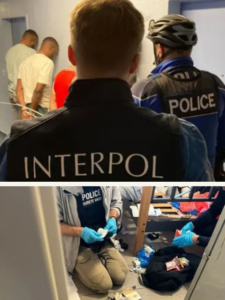Interpol Arrest 300 People in connection with Notorious Cult Group
Interpol Arrest 300 People in connection with Notorious Cult Group

Interpol has apprehended over 300 individuals connected to one of West Africa’s most feared criminal syndicates and its affiliates. This action was part of a series of covert operations, known as “Operation Jackal III,” conducted across 21 countries from April to July 2024. According to Interpol, this sophisticated cybercrime network is linked to some of the most significant cyber-enabled financial frauds and other severe crimes, as reported by the BBC.
The operation represents a substantial setback for the Nigerian criminal network, though authorities caution that its global reach and advanced technological capabilities pose a continuing worldwide threat. The crackdown resulted in the seizure of $3 million in illicit assets and the freezing of over 700 bank accounts.
Tomonobu Kaya, a senior official at Interpol’s Financial Crime and Anti-Corruption Centre, highlighted how advancements in financial technology and cryptocurrency facilitate the operations of these cybercrime syndicates, which are known for massive online scams. He remarked, “These syndicates are very well-organized and quick to adopt new technologies. Innovations in fintech have made it easier for them to move money illegally across the globe.”
The network in question is involved in various criminal activities, including trafficking and murder, with cybercrime being its primary revenue source. Many members of this group are university graduates who were recruited during their studies.
A 2022 Interpol report noted that such groups are major contributors to global cyber-enabled financial fraud and other serious crimes. Previous “Jackal” operations have led to numerous arrests and the confiscation of electronic devices. For instance, Canadian authorities uncovered a money-laundering scheme linked to the network in 2017, involving over $5 billion.
Addressing these sophisticated criminal organizations requires advanced technological capabilities. Interpol has introduced the Global Rapid Intervention of Payments system, which allows member countries to swiftly freeze bank accounts worldwide. This system was used to thwart a $40 million scam targeting a Singaporean company in July 2024.
Kaya emphasized the need for comprehensive data collection to understand these criminal networks’ methods. “Gathering data helps us build a clearer picture of their operations and take effective action,” he said.
Dr. Oluwole Ojewale from the Institute for Security Studies criticized the government for its inadequate measures against criminal networks and suggested that political figures might use these groups for personal gain. He argued that preventing such criminal activity should be prioritized over reactive operations.
In February 2024, President Bola Tinubu pledged to enhance support for the Economic and Financial Crimes Commission to better address digital crimes, rejecting the stereotype of Nigeria as a hotspot for cybercrime. The Nigerian Senate had previously highlighted a $500 million annual loss to cybercrime and stressed the need for proper funding of the national cybersecurity program to protect the digital economy.
The origins of Interpol’s Jackal Operations trace back to Ireland. In 2020, the Garda National Economic Crime Bureau identified 1,000 people linked to the network and made several arrests, uncovering a much larger network. Detective Superintendent Michael Cryan noted that Ireland had seen a significant rise in money laundering due to the network’s activities, with online thefts estimated at €200 million over five years. He also pointed out that only a fraction of cybercrimes are reported, with over €1 million in crypto-assets seized in one operation.
TRENDING SONGS
 NPMA Appeals to Nigerian Government for Compensation After Lagos Market Fire
NPMA Appeals to Nigerian Government for Compensation After Lagos Market Fire
 Rest Every Four Hours, FRSC Issues Safety Guide for Fasting Motorists
Rest Every Four Hours, FRSC Issues Safety Guide for Fasting Motorists
 NNPC Boss Ojulari Bags UK Energy Institute Fellowship
NNPC Boss Ojulari Bags UK Energy Institute Fellowship
 Shock in Anambra: Bride Disappears Moments Before Wedding
Shock in Anambra: Bride Disappears Moments Before Wedding
 Nigerian Woman Returns ₦330 Million Accidentally Credited to Her Account
Nigerian Woman Returns ₦330 Million Accidentally Credited to Her Account
 APC Don Reach Morocco?’ VeryDarkMan Reacts to Seyi Tinubu Poster
APC Don Reach Morocco?’ VeryDarkMan Reacts to Seyi Tinubu Poster
 Bride Breaks Down in Tears as Wedding Meals Were Kept Secretly While Guests Go Home Hungry
Bride Breaks Down in Tears as Wedding Meals Were Kept Secretly While Guests Go Home Hungry
 Odogwu by Day, Robber by Night: How Marriage Joy Turned Into Tragedy
Odogwu by Day, Robber by Night: How Marriage Joy Turned Into Tragedy
 Nigerian Officials Allegedly Pocket N4–6B Weekly Through Smuggling Cartels at Seme–Badagry Border
Nigerian Officials Allegedly Pocket N4–6B Weekly Through Smuggling Cartels at Seme–Badagry Border
 Ahmad Yerima: Naval Officer to Face No Sanctions After Clash with Wike – Matawalle
Ahmad Yerima: Naval Officer to Face No Sanctions After Clash with Wike – Matawalle
Share this post with your friends on ![]()













